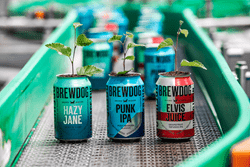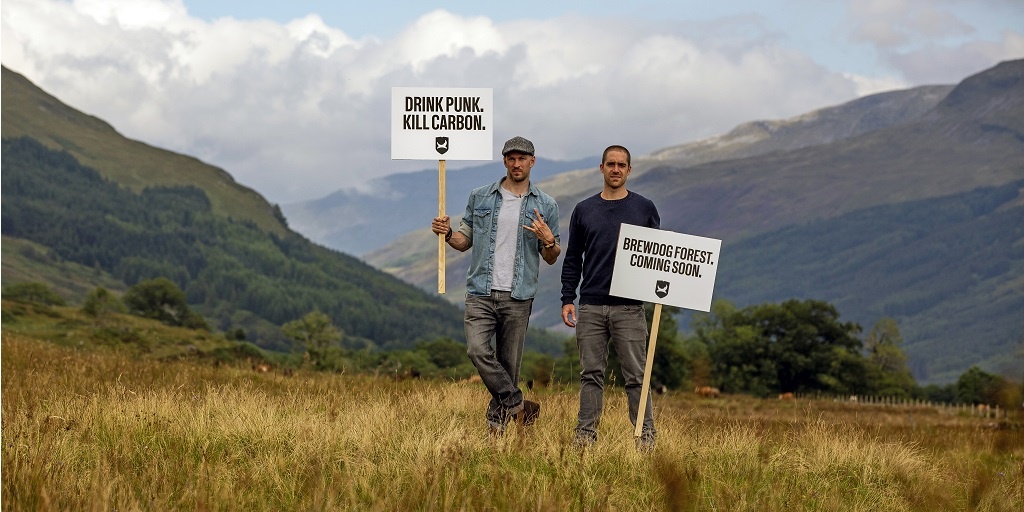On August 28, 2020, the world’s largest craft brewer, Scotland-based BrewDog, announced that will become carbon negative, removing twice as much carbon from the air than it emits every year.
As first described in the seminal 2002 book, The Restoration Economy—and more recently updated in the 2020 book, RECONOMICS: The Path To Resilient Prosperity—this takes Brewdog out of the ranks of the merely sustainable (which seeks to reduce the amount of new damage done) into the realm of restorative. Only carbon-negative activities actually restore our climate: low-carbon and zero-carbon only slow down that rate at which the climate crisis is worsened.
 These moves make BrewDog the first carbon-negative international beer brand in the world, as it sets out to restore the global climate and make a regenerative impact on the planet.
These moves make BrewDog the first carbon-negative international beer brand in the world, as it sets out to restore the global climate and make a regenerative impact on the planet.
The move is founded in BrewDog’s belief that carbon neutral is no longer enough, and that businesses should be having a positive impact on the planet. To this end, BrewDog is unveiling a climate action program and sustainability report that outlines $39 million of green investments across its business.
As part of these efforts, BrewDog has also purchased 2050 acres of Scottish Highlands just north of Loch Lomond, to create the BrewDog Forest, and plans to plant one million trees over the next few years, beginning in early 2021.
The brewer also plans to create a sustainable campsite on the land, that will host sustainability retreats and workshops for the general public, in addition to inviting its 130,000 Equity Punks investors to help with tree planting.
Sustainability projects planned for BrewDog USA include solar panels to power the Columbus, Ohio brewery and headquarters; hop farm and apple orchard added to the brewery campus; wastewater treatment plant; anaerobic digester; and electric delivery vehicles.
Over the past few months, BrewDog has been working closely with lead scientific advisor Professor Mike Berners-Lee and his team at Small World Consulting. Berners-Lee is one of the world’s leading experts in carbon foot-printing and sustainability and has led the process of calculating BrewDog’s carbon footprint and been pivotal in the design of its carbon removal plan. The partnership has helped to direct over $39 million of investment into green infrastructure to support the business in reducing carbon emissions.
In order to double remove all of its carbon until it is able to begin planting the BrewDog Forest, the brewer will be working with offset partners on a series of projects. Each organization has the highest standard of accreditation and has been vetted by Berners-Lee and his team with each project deemed beneficial to biodiversity and local communities.
James Watt, Co-founder of BrewDog commented, “Our Carbon. Our Problem. So, we are going to fix it ourselves. Huge change is needed right now, and we want to be a catalyst for that change in our industry and beyond. We fully acknowledge that we are a long way from perfect. However, we are determined to rapidly and fundamentally change everything as we work hard to ensure we have a positive impact on the planet.”
Berners-Lee, Founder of Small World Consulting continued, “After decades of inaction, we have a full-on climate crisis on our hands. The scale and speed of the change we now need is enormous, and cuts right across politics, business and every corner of society. The good news is that if we are smart about our transition, we can make our lives better at the same time as making them more sustainable. With the actions laid out in this report, BrewDog is giving some of the leadership the world so badly needs.”
Green projects currently underway at BrewDog Ellon (Scotland) include:
- Brewery and UK bars are now wind powered;
- Spent grain is turned into green gas to power the brewery;
- An onsite anaerobic digestor is being built to turn wastewater into clean water and produce food-grade CO2 to carbonate beers;
- Investments are being made in the electrification of the vehicle fleet; and
- Local brewing sites across the UK, EU, USA and Australia have significantly reduced the miles beer is traveling to reach consumers.
Photos courtesy of Brewdog.

